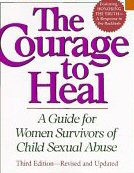Positive Sex Play for Sexual Abuse Survivors
An article for anyone who is a survivor of sexual abuse.
Statistically, it has been found that 1 out of every 3 girls and 1 out of every 5 boys has been sexually abused before the age of 18. This is a huge number and it means that probably a large portion of our readers are sexual abuse survivors. Also, many of our readers are involved with a sexual abuse survivor.
As a child, your sexuality was taken from you without permission, or with permission that you were not old enough to give. Now that you are an adult, I applaud you for wanting to reclaim your sexuality. I do recommend, however, that this should not be your first step in trying to heal from your abuse. Working on one's sexuality, as a survivor, often is the hardest part of recovery and is not recommended for someone who hasn't already worked through the majority of their recovery from sexual abuse.
Healthy Sexuality Is Possible
It is possible to have a healthy sexuality as an adult who was molested as a child. Often, however, survivors find that this is a difficult area in which to heal. This is due to many reasons. For some, sex can act as a trigger, bringing back memories of the abuse. These individuals may find themselves unable to have sex without feeling bad, ashamed, pained, etc. For others they find that they can have lots of sex but that the sex isn't attached to any emotions and in this way it cannot meet the survivor's needs. Maybe in a similar way that sex was used to hurt the survivor when they were young, now the survivor uses sex to hurt themselves, either by practicing unsafe sexual methods or by being sexual with people whom they don't trust and/or who are not emotionally and/or physically safe. Many survivors check-out or dissociate during sex. Maybe they are having sex, but instead of being emotionally present during the sexual time they are thinking about other things and are really very emotionally/psychically distant from the sex in which they are participating.
Staci Haines, author of The Survivor's Guide to Sex (1999), discusses in a very helpful way how an adult survivor of childhood sexual abuse can heal sexually. The first thing to tackle is making sure that you are in a safe environment before progressing in your sexual recovery. You may find this difficult because you may never feel safe, especially when in a sexual environment. Or you may think that you are safe even when you aren't because you are so used, from having been abused to being unsafe. Therefore, it is a good idea to try to find some objective ways to judge your safety. You need to not be experiencing abuse on any level. This means that you are not being emotionally, physically or sexually abused or assaulted. If you have a partner, does he/she respect your needs, wants, feelings, and behavior? Are you free to make your own decisions? It is important that you are free to guide your life and that your partner or someone else isn't trying to control your life. Is your partner capable of meeting your needs and supporting you through this journey? Answering yes to these questions is an indication that you are in a safe environment.
Haines points out that it is important for a survivor to figure out what they really want to achieve from working on their sexual survivorship. What she means is that it is important to have a realistic goal in mind so that you can stay focused on the goal when you get overwhelmed or frustrated. Next, it is going to be important to figure out what your regular sexual practices, behaviors, and actions are. Her goal is to then help survivors move very slowly from their current sexual practices to more liberated or healthy practices. She emphasizes that this must be done in very slow, very small steps; otherwise, you are likely to get overwhelmed. She points out that for a very long time, survivors will behave in one way and that those regular behaviors cannot be changed overnight. She emphasizes that survivors just beginning on their sexual survivorship work should masturbate regularly. This will allow them to find new techniques that they like without having to worry about anyone else. It will also help the survivor overcome their first challenge of fear of self-pleasure. Many survivors feel overwhelming guilt at enjoying sex. This will allow them to address this issue on their own. If you are afraid to masturbate, try to practice being sensual without masturbation initially.
Haines believes that the ultimate goal for survivors trying to heal their sexual lives is to increase their capacity for both discomfort and pleasure without dissociating. Usually what survivors do when confronted with discomfort or pleasure is that they will check-out or dissociate. They cease to be emotionally present.
The problem with dissociation during sex is multi-fold. First, if the survivor is dissociated, they cannot give appropriate consent. Being able to say yes when you mean yes and no when you mean no is vital to being safe and is the polar opposite of being abused. Also, when one is dissociated one is not able to have emotional intimacy. When someone is checked-out, they may not realize that something doesn't feel good or hurts and they may be injured because they were not present enough at the time to identify their physical reactions. Finally, if a survivor is not present emotionally/psychically during sex, they are much less likely to be able to develop an inventory of what they do and don't like. Figuring out what you do and don't like sexually is a huge factor in sexual recovery.
The only way to increase your capacity for both pleasure and discomfort is going to be to go very slowly; changing teeny weenie behaviors while allowing yourself to fully feel your emotions that these new little changes bring up for you. The key to healing from sexual abuse is feeling your feelings, and it is no different when recovering sexually.
 There is no way that one article can serve as a complete guide to sex-positive play for survivors or survivor recovery. I highly recommend picking up Haines' book, The Survivor's Guide to Sex if you are interested in sexual survivorship. If you would like to read a good book and use a good workbook for surviving childhood sexual abuse as an adult please read/use The Courage to Heal (1994) by Ellen Bass & Laura Davis and The Courage to Heal Workbook (1990) by Laura Davis. Both of these books are very well-respected in the sexual abuse treatment and self-help communities. Finally, if you ever need to talk to someone call the Rape Abuse Incest National Network (RAINN) Hotline at 800-656-HOPE. When you call RAINN, they will put you through to a participating rape crisis center in your area that can provide both crisis hotline assistance and counseling services. You can visit RAINN's website at http://www.rainn.org.
There is no way that one article can serve as a complete guide to sex-positive play for survivors or survivor recovery. I highly recommend picking up Haines' book, The Survivor's Guide to Sex if you are interested in sexual survivorship. If you would like to read a good book and use a good workbook for surviving childhood sexual abuse as an adult please read/use The Courage to Heal (1994) by Ellen Bass & Laura Davis and The Courage to Heal Workbook (1990) by Laura Davis. Both of these books are very well-respected in the sexual abuse treatment and self-help communities. Finally, if you ever need to talk to someone call the Rape Abuse Incest National Network (RAINN) Hotline at 800-656-HOPE. When you call RAINN, they will put you through to a participating rape crisis center in your area that can provide both crisis hotline assistance and counseling services. You can visit RAINN's website at http://www.rainn.org.
And remember that you are not alone. This has happened to others, and it was not your fault. Just the fact that you have read this article shows me that you are no longer a victim of your abuse but instead a strong, empowered survivor flying free toward your future!
APA Reference
Staff, H.
(2021, December 29). Positive Sex Play for Sexual Abuse Survivors, HealthyPlace. Retrieved
on 2024, May 8 from https://www.healthyplace.com/sex/abuse/positive-sex-play-for-sexual-abuse-survivors


